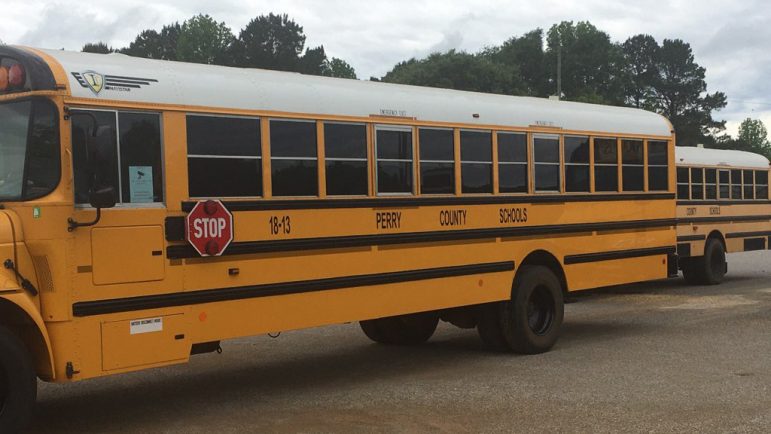In Rural Alabama, Pandemic Highlights Need For Broadband Access
Ben Eaton is one of roughly 9,000 people who live in Perry County, about an hour’s drive south of Tuscaloosa in the Black Belt region of Alabama. Eaton’s house is one mile from the center of town and, according to him, it is the last one on the street that has internet.
“It works sometimes. Sometimes it doesn’t,” he said.
He has a dial-up connection, which is pretty much the only option. Internet access has been a problem for years throughout rural Alabama. According to one survey, the state ranks 38th nationwide in broadband coverage. People in Perry County have especially felt the impact during the COVID-19 crisis.
“We need broadband,” Eaton said. “We need something that’s gonna help us get us through this.”
The Virtual Classroom
Schools have been closed for more than a month and teachers are supposed to be finishing classes remotely. But at least 20% of students in Perry County don’t have access to the internet at home. According to the local school superintendent, John Heard III, those with coverage have a slow connection or use cell phone data.
“It’s not very practical for a lot of our students because they don’t have the bandwidth to even do the Zoom sessions,” Heard said.
Schools are offering paper packets, but Heard said it’s not the same. Educators rely on the internet now. A few years ago, the district started providing students with an iPad or a ChromeBook, with assistance from the Apple ConnectEd program, and they have high speed internet at school. They just need access at home.
The Perry County school board recently invested in 10 buses equipped with WiFi. Starting this week, they are parked throughout the county every day from 11 a.m. to 3 p.m., providing free internet to anyone within 150 feet.

Perry County Schools
Perry County plans to continue using the WiFi-equipped buses after schools re-open. Heard said some students spend more than three hours every day on the bus and can use the internet to work on homework.
Heard said the school system paid more than $1,200 to outfit each bus, which is a lot of money for a poor county lacking revenue. But they had to do something.
“We just could not wait until we had the funds at hand,” Heard said, “because school would have been, you know, out.”
He said people in the area have been asking for broadband access for more than a decade, and not only to improve education.
Health Care From Home
Many people cannot work from home without an internet connection and some have already lost income as a result, according to Susan Jones, communications director of the nonprofit Sowing Seeds of Hope. Jones said in urban areas, people also use the internet to manage chronic illnesses and visit with a doctor, but she said residents in Perry County cannot get the full benefits of telemedicine.
“As far as the high tech things that make telemedicine so unique and so effective, where they can actually do some examinations of you, that’s not possible without better internet access than we currently have in most parts of the county,” Jones said.
At the same time, she said residents need more health care options. There is no hospital in Perry County, and people in the area have some of the worst health outcomes in Alabama. Heard said the COVID-19 crisis might finally spark action from state leaders.
“This pandemic has kinda highlighted that real need,” Heard said. “So I think we’re probably at a good spot for something to really happen besides talk at this point. We certainly hope so.”
Delayed Action
In 2018, Governor Kay Ivey started a fund to extend broadband to underserved areas. She recently used it to award nearly $10 million in grant money, though none of those projects will reach Perry County.
Democratic U.S. Senator Doug Jones said there is widespread political support for broadband expansion, and he expects to see more action soon.
“I think it has been a priority for the state of Alabama, as well as the Feds,” Jones said, “but now, we’ve got to rush that up.”
The state expects to receive $1.7 billion of federal relief money to address issues related to COVID-19. Alabama’s top Republican senator Del Marsh recently said he’d like to see $800 million of that go to broadband expansion.
40 years after ‘Purple Rain,’ Prince’s band remembers how the movie came together
Before social media, the film Purple Rain gave audiences a peak into Prince’s musical life. Band members say the true genesis of the title song was much less combative than the version presented in the film.
Park Fire in California could continue growing exponentially, Cal Fire officer says
Cal Fire has confirmed that over a hundred structures have been damaged in the Park Fire, which grew overnight near Chico, Calif. Difficult firefighting conditions are forecast through Friday night.
Checking in with Black voters in Georgia about the election, now that Biden is out
Some voters who could be key to deciding who wins Georgia. What do they think about Vice President Harris becoming the frontrunner in the race to be the Democratic nominee?
Tahiti’s waves are a matter of ‘life and death’ for surfing Olympics
Tahiti's Teahupo'o wave has a slew of riders for the Paris 2024 Olympics. NPR finds out why it's called one of the most dangerous waves.
Researchers are revising botanical names to address troubling connotations
Since the mid-1700s, researchers have classified life with scientific names. But some of them have problematic histories and connotations. The botanical community is trying to tackle this issue.
A spectacular opening ceremony wowed a global audience despite Paris’ on-and-off rain
The Paris Olympics opening ceremony wowed Parisians, fans and most everyone who was able to catch a glimpse of thousands of athletes floating down the Seine to officially begin the Games.


